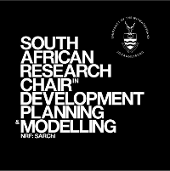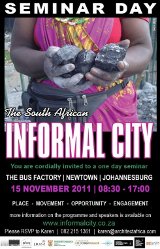You are here
THE SA INFORMAL CITY SEMINAR 2011
The South African Informal City seminar is organised in collaboration with the Johannesburg Development Agency, SA Cities Network, Neighbourhood Development Programme (National Treasury), the National Research Foundation and the South African Planning Institute.
The goal is to set up a platform for discourse around informality and sustainable city development, and to further cooperation, information sharing and positive action between decision makers, practitioners, academics and civil society involved in this field.
The one-day programme covers four themes:
HOW TO DOWNLOAD SEMINAR PAPERS IN PDF
FORMAT
- There is a PDF download link on the footer of each page.
- To download all Seminar Papers please visit the Seminar Download Page.
Powered by AA Media and The Architects Collective of South Africa






